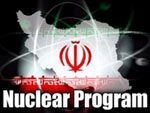 Reuters: Iran and the U.N. nuclear watchdog ended two days of talks on Tuesday by agreeing to meet again next week, just two days before Tehran resumes negotiations with world powers concerned it may be seeking to develop atomic bomb capability.
Reuters: Iran and the U.N. nuclear watchdog ended two days of talks on Tuesday by agreeing to meet again next week, just two days before Tehran resumes negotiations with world powers concerned it may be seeking to develop atomic bomb capability.
By Fredrik Dahl
 VIENNA, May 15 (Reuters) – Iran and the U.N. nuclear watchdog ended two days of talks on Tuesday by agreeing to meet again next week, just two days before Tehran resumes negotiations with world powers concerned it may be seeking to develop atomic bomb capability.
VIENNA, May 15 (Reuters) – Iran and the U.N. nuclear watchdog ended two days of talks on Tuesday by agreeing to meet again next week, just two days before Tehran resumes negotiations with world powers concerned it may be seeking to develop atomic bomb capability.
While both sides were upbeat about the discussions, which will continue on Monday, there was no word on whether the U.N. agency had made progress towards one of its main aims – to secure access to a suspect military site near Tehran.
“We had a good exchange of views and we will meet again on Monday,” International Atomic Energy Agency (IAEA) Deputy Director General Herman Nackaerts told reporters at the Iranian diplomatic mission in Vienna where the meeting took place.
Standing next to him, Iranian Ambassador Ali Asghar Soltanieh was more positive. “We had fruitful discussions in a very conducive environment. We have had progress,” he said.
Neither side gave details about the content of the talks and they did not say if they discussed Iran allowing U.N. inspectors to visit the Parchin military site where the watchdog suspects nuclear bomb-relevant research has been carried out.
Western diplomats, watching the meeting for any sign Iran is ready to make concrete concessions ahead of the encounter in Baghdad next week, were not convinced.
“It is too early to say whether progress was made. There are apparently some serious sticking points,” said one, speaking on condition of anonymity.
“The onus remains on Iran to address the agency’s – and international community’s – concerns about its nuclear programme.”
The IAEA had hoped to secure agreement on access to Iranian sites, documents and officials involved in suspected development work that could be put to use producing nuclear explosives.
Two previous rounds of talks in Tehran this year with U.N. inspectors failed to make any notable progress, especially on their request to go to Parchin.
CONCRETE ACTION
Iran and the powers involved in nuclear diplomacy – the United States, Russia, China, Britain, France and Germany – revived negotiations in Istanbul last month after a 15-month hiatus during which the West cranked up sanctions to unprecedented levels – targeting Iran’s oil trade and banks.
The resumption of diplomacy offers a chance to defuse that tension as well as worries about a new Middle East war.
Israel, widely believed to hold the Middle East’s only nuclear arsenal, has, like the United States, not ruled out military action to stop Iran’s nuclear progress if it deems diplomacy has failed.
British Foreign Secretary William Hague said Iran had yet to show it was “willing to take concrete action to address concerns about possible military dimensions of its nuclear programme, which is what we will look for in Baghdad.”
A step-by-step process “should start with steps by Iran to build confidence in its nuclear activities,” he told parliament.
The IAEA, the U.N. agency tasked with preventing the spread of nuclear arms, said before the meeting that its priority was to visit Parchin where Iran may have conducted high-explosives tests relevant for developing atomic arms capability.
“The primary focus of our discussions was how to clarify issues related to possible military dimensions of Iran’s nuclear programme,” Nackaerts said.
The parties considered options for taking the “agency verification process forward in a structured way,” he said.
Iran, which rejects Western accusations it is seeking nuclear weapons, has resisted previous requests by the IAEA to go to the Parchin complex, southeast of Tehran.
An IAEA report last November found that Iran had built a large containment vessel there in 2000 to conduct tests that the U.N. agency said were “strong indicators of possible (nuclear) weapon development”.
Western diplomats say they suspect Iran is cleaning the Parchin site to remove incriminating evidence.
One envoy told Reuters he had seen satellite imagery showing vehicles near the place the IAEA wants to see, and an apparent stream of water coming from the building.
Iran’s Foreign Ministry has dismissed the allegations, saying nuclear activities cannot be washed away.
A Vienna-based expert who declined to be identified said it would be difficult, but not impossible, to clean possible traces of uranium or substitute materials from a site.
A Western priority is for Iran to halt the higher-grade uranium enrichment work it started two years ago and has since expanded, potentially shortening the time needed to build a bomb.
Refined uranium can be used to fuel nuclear power plants, which is Iran’s stated goal, or provide material for bombs if processed further, which the West suspects is the country’s ultimate intention. (Additional reporting by Adrian Croft in London; Editing by)


